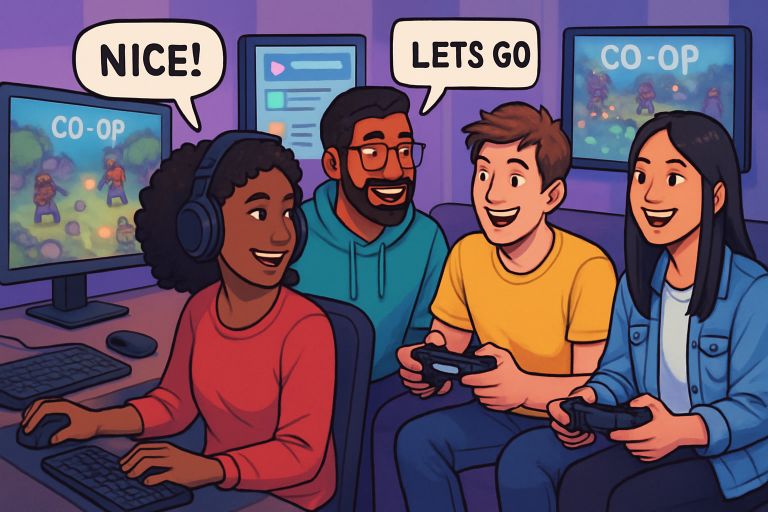Introduction
Multiplayer gaming communities have evolved from isolated circles into expansive global ecosystems that redefine how people play, connect, and grow together online. Whether players are forging new friendships or sharpening their skills, these communities foster real-world benefits far beyond entertainment. Enthusiasts looking to create virtual gatherings can easily host Minecraft servers, seamlessly building spaces for collaboration and creativity from scratch. The accessibility and adaptability of modern platforms have made it possible for anyone, anywhere, to be part of thriving digital worlds.
By lowering barriers to entry and encouraging cooperation, multiplayer gaming encourages shared experiences and cultivates lasting bonds among participants worldwide. This network of shared interests helps people discover diverse perspectives, gain social confidence, and explore new possibilities—whether they’re competing competitively or just looking to relax with friends. As more tools become available to facilitate these connections, the opportunities for players to shape their virtual environments, communicate safely, and support each other are virtually limitless.
Global Connectivity: Breaking Down Barriers
One of the most remarkable aspects of multiplayer gaming is its ability to unite people across continents, age groups, and backgrounds. Through shared digital spaces, players collaborate in real-time, communicate using built-in voice or text tools, and develop relationships that reach far outside the confines of the game itself. These connections encourage cultural exchange and provide a forum for understanding and celebrating differences—often turning strangers into teammate allies or lifelong friends. Games like MMOs and competitive shooters have become modern meeting places, allowing communities to form based on mutual interests, objectives, or fandoms rather than location.
Creating Inclusive Spaces for Socializing
Modern gaming platforms are increasingly invested in making players feel welcome, respected, and protected. Developers have implemented sophisticated moderation, reporting tools, and clear codes of conduct to minimize harassment and toxicity. Initiatives to promote inclusivity and diversity—spotlighting players of all identities and backgrounds—are gaining momentum, making it easier for everyone to participate without fear of discrimination. Social platforms like Discord allow users to interact, celebrate achievements, or unwind among like-minded individuals. At its best, multiplayer gaming is not just a pastime—it’s a thriving hub of creativity, mutual support, and lifelong friendships.
Fostering Teamwork and Collaboration
Cooperative play lies at the heart of many multiplayer games, demanding not just technical skill but also communication, empathy, and leadership.
Team-based objectives, such as conquering a raid boss or constructing an in-game world, teach players how to organize roles, resolve conflicts, and share in the rewards of collective effort. These collaborative undertakings often build bonds that persist beyond the screen, encouraging real-world applications of teamwork. Competitive matches, meanwhile, necessitate fast thinking, trust, and respect for others’ strengths—transferable skills to academic, personal, or professional environments.
The Role of Technology in Community Growth
Technology has fundamentally shaped the experience and accessibility of modern gaming communities. Virtual and augmented reality redefine immersion by allowing players to step physically into game worlds. At the same time, cloud gaming reduces technical barriers by making high-quality gaming available without expensive hardware. Social streaming platforms allow gamers to share experiences, attract audiences, and build extensive followings while providing valuable resources and inspiration for newcomers. These advancements democratize community building, empowering individuals to create or join groups and shape their digital destinies from any device, anywhere in the world.
Support Networks and Mental Health Awareness
For many, gaming communities serve as lifelines for social interaction, support, and self-expression. Players routinely rely on their online networks not just for fun but also for emotional encouragement and practical advice. Online forums, in-game guilds, and dedicated mental health channels create safe havens where members can speak candidly about difficulties or seek guidance from people who share their passion and empathy. These virtual spaces foster resilience, lower stress, and boost well-being, especially when moderated compassionately and intentionally. In competitive scenes, constructive feedback and camaraderie can transform setbacks into opportunities for growth, both in-game and out.
Future Trends in Multiplayer Gaming Communities
As technology and social awareness progress, multiplayer gaming communities are poised to become more dynamic and supportive. New features enabling granular control over privacy, accessibility, and inclusivity will allow communities to define their atmospheres and values. Real-time language translation, adaptive matchmaking, and AI-driven moderation are on the horizon, promising smoother, safer experiences for all.
The future will likely see communities leveraging their scale and creativity to catalyze positive social movements, organize real-world events, and serve as testing grounds for the collaborative skills that fuel modern society. From building virtual cities to supporting friends worldwide, these communities are leading the way in redefining how we play, connect, and thrive together.



More Stories
Master the Busy Sports Schedule and Betting Smarter on Roobet
The Future of Intimacy: How Sex-Tech and VR Bridge the Distance in 2026
Invisible Guests at the Table: Navigating the Microplastic Crisis in Our Daily Diet